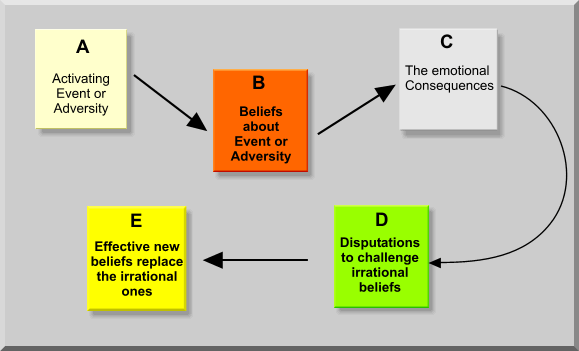Unlocking Emotional Wellness with Rational Emotive Behavior Therapy (REBT)
Life's challenges can often trigger a cascade of stress, anxiety, and self-doubt. How we interpret and react to these challenges can significantly impact our mental well-being. Rational Emotive Behavior Therapy (REBT), developed by psychologist Albert Ellis in the 1950s, offers a powerful framework for understanding and reshaping the irrational beliefs at the heart of our emotional distress.

What is REBT?
REBT is a form of cognitive-behavioral therapy that helps individuals to identify, challenge, and replace their irrational beliefs with more rational and adaptive thoughts. This process not only alleviates emotional distress but also promotes positive behavioral changes, enhancing personal and professional relationships.
Core Concepts of REBT
-
Ellis introduced the concepts of "awfulizing" and "musterbating" to describe common irrational thought patterns:
-
Awfulizing: For example, if you’re running late due to traffic, you might think, "This is the worst thing ever!" This kind of thinking amplifies stress and is disproportionate to the actual inconvenience.
-
Musterbating: This involves absolute thinking such as, "I must always be successful," which sets an unrealistic standard and can lead to feelings of failure and disappointment.
-
Recognizing and addressing these thought patterns are fundamental steps in REBT, allowing individuals to move towards more rational and flexible ways of thinking.
Techniques Used in REBT
REBT employs several strategies to help individuals replace destructive thoughts with healthier ones:
-
Positive Visualization: Prior to facing a stressful event, you might visualize yourself handling it calmly and effectively, setting a positive expectation.
-
Reframing: Changing your viewpoint on a situation to perceive it more positively. For instance, instead of seeing a job rejection as a failure, view it as a step toward finding a better-suited position.
-
Self-help Materials: Engaging with books and multimedia resources reinforces therapy concepts and supports personal growth outside of sessions.
-
Homework Assignments: Practical tasks and exercises that encourage the application of new skills in everyday situations.
The ABCDE Model of REBT
This model outlines the process of changing irrational thoughts:
-
Activating event: An event occurs, such as receiving feedback at work.
-
Belief: You might think, "My boss thinks I'm incompetent."
-
Consequence: This belief could lead to feelings of anxiety or low self-esteem.
-
Dispute: You question the rationality of your belief, considering whether the feedback might actually be constructive.
-
Effective behavior: By adopting a rational belief, you might decide to use the feedback as a learning opportunity, leading to improved performance and reduced anxiety.
Real-World Application
REBT is particularly beneficial for those dealing with negative emotions and self-defeating behaviors. It's not only used for emotional issues but also for improving personal development and achieving life goals. By adopting REBT strategies, individuals learn to face life's challenges with a healthier mindset and more effective coping strategies.
Conclusion
Rational Emotive Behavior Therapy provides a clear, structured approach to overcoming emotional and behavioral challenges. By identifying and altering irrational beliefs, REBT helps individuals achieve greater emotional resilience and a more positive outlook on life.